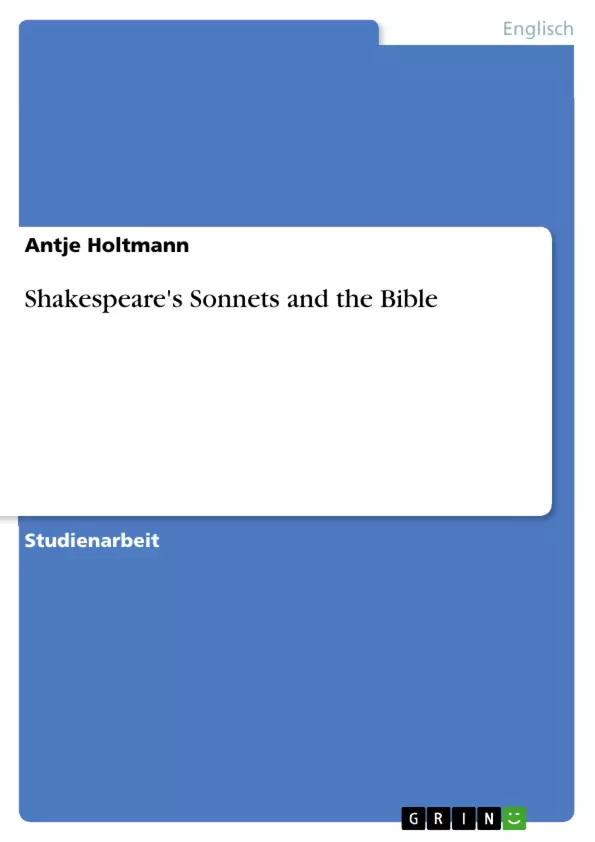The topic of Shakespeare and Religion is not a new one, but it has “come to the
foreground” due to the “recent “turn to religion” in historical and literary scholarship” (Jackson/Marotti 1). Thus, it is has been tried “to make sense of the dramatist’s awareness of, relation to, and use of religious beliefs, religious culture” (Jackson/Marotti 1). In this term paper, I want to focus on biblical references and allusions in the Sonnets. In order to do that, I will at first take a look into the matter of religion in Shakespeare's time. I will also examine his personal religious beliefs. After that, will look into religious allusion in Shakespeare's writing, i.e. firstly his plays and secondly his poetry. As I want to focus on the Sonnets, a closer look will be provided on three selected ones. These analyses will focus on the biblical references and allusions they contain. Therefor, a detailed analysis in terms of literary devices will not be given. Moreover, I
will not describe the characteristics of the Sonnet from.
Inhaltsverzeichnis
- Introduction
- Religion in Shakespeare's Time
- Historic background
- Shakespeare - A Catholic or a Protestant?
- Religion and Shakespeare's writings
- Shakespeare's plays
- Shakespeare's poetry
- Religion in the Sonnets - A critical analysis
- Sonnet 146
- Sonnet 116
- Sonnet 55
- Conclusion
Zielsetzung und Themenschwerpunkte
Diese Arbeit analysiert biblische Bezüge und Anspielungen in Shakespeares Sonetten. Sie beleuchtet zunächst die religiöse Situation Shakespeares Zeit, untersucht seine persönlichen religiösen Überzeugungen und analysiert anschließend religiöse Anspielungen in seinen Werken, insbesondere in den Sonetten. Drei ausgewählte Sonette werden im Detail betrachtet, um ihre biblischen Bezüge aufzuzeigen.
- Die religiöse Situation in Shakespeares England
- Die Frage nach Shakespeares eigener religiösen Zugehörigkeit
- Religiöse Anspielungen in Shakespeares Werken
- Die Rolle der Bibel in Shakespeares Sonetten
- Die Analyse ausgewählter Sonette in Bezug auf biblische Bezüge
Zusammenfassung der Kapitel
Das erste Kapitel befasst sich mit der Einleitung und stellt die Relevanz des Themas "Shakespeare und Religion" in der modernen Forschung dar. Das zweite Kapitel analysiert die religiösen Verhältnisse in England zur Zeit Shakespeares und schildert die historischen Umstände der Reformation. Es beleuchtet die Frage, ob Shakespeare Katholik oder Protestant war, und diskutiert verschiedene Argumentationslinien. Das dritte Kapitel behandelt die Rolle der Religion in Shakespeares Werken, sowohl in seinen Dramen als auch in seinen Gedichten.
Das vierte Kapitel widmet sich der Analyse biblischer Bezüge in Shakespeares Sonetten. Es analysiert drei ausgewählte Sonette im Detail und zeigt die Art und Weise auf, wie Shakespeare biblische Themen und Sprache in seinen Gedichten verwendet.
Schlüsselwörter
Die Arbeit befasst sich mit den Themen Religion, Bibel, Shakespeare, Sonette, historische Kontext, Reformation, Katholizismus, Protestantismus, literarische Analyse, biblische Anspielungen, literarische Mittel.
Häufig gestellte Fragen
Welche Rolle spielt die Bibel in Shakespeares Sonetten?
Shakespeare nutzt zahlreiche biblische Anspielungen und Referenzen, um komplexe Themen wie Moral, Sterblichkeit und Liebe zu untermauern.
War William Shakespeare Katholik oder Protestant?
Dies ist eine zentrale Forschungsfrage. Die Arbeit untersucht seine persönlichen Überzeugungen im Kontext der Reformation und der religiösen Spannungen seiner Zeit.
Welche Sonette werden in Bezug auf Religion analysiert?
Drei ausgewählte Sonette stehen im Fokus: Sonett 146, Sonett 116 und Sonett 55.
Wie beeinflusste die Reformation Shakespeares Werk?
Die Reformation prägte die religiöse Kultur Englands tiefgreifend. Shakespeare verarbeitete dieses Wissen und die religiöse Sprache in seinen Dramen und Gedichten.
Gibt es religiöse Unterschiede zwischen Shakespeares Dramen und seiner Lyrik?
Die Arbeit untersucht, wie religiöse Themen in beiden Gattungen unterschiedlich gewichtet und durch verschiedene literarische Mittel zum Ausdruck gebracht werden.
- Arbeit zitieren
- Antje Holtmann (Autor:in), 2012, Shakespeare's Sonnets and the Bible, München, GRIN Verlag, https://www.grin.com/document/211629



